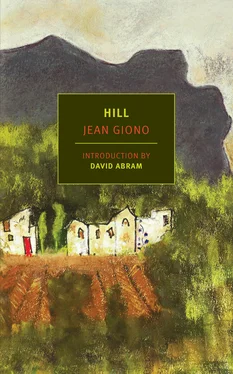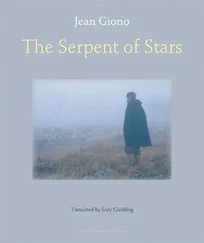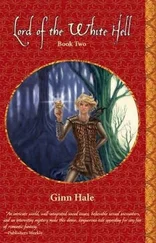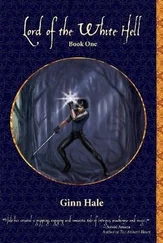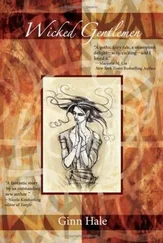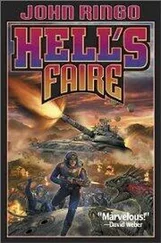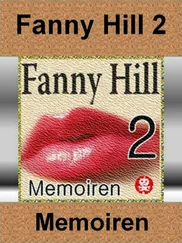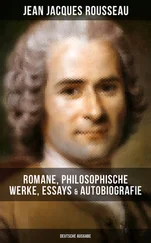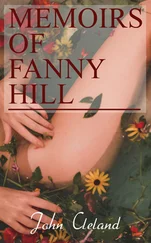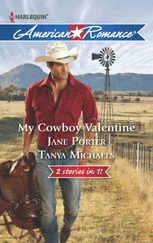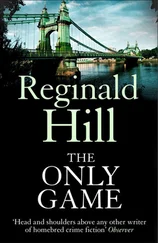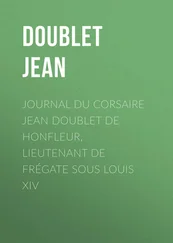“Do as you like.”
Even so, he’s gotten up at six o’clock this morning. It’s no small deal to go to Manosque. You have to bring out your good clothes, unfold them, sweep off the mothballs, find a neckerchief, brush your hat, polish your shoes, shave…
While he’s lathering up his soap with crystal-clear water from the fountain, he thinks about that morning, not long ago, when Gondran shaved with wine. Now there are six good feet of earth piled up over Janet, and the spring has come back to life. Just in the nick of time, like Maurras said. Jaume has had enough, he’s weary. He’s lost weight. He thinks about flowers, about hayfields in flower, and how the women call out to each other while they’re forking over the hay.
“Hey, Jaume!” shouts Arbaud from below.
Jaume hasn’t really snapped out of it yet — he jumped up right away, but then, while he was opening the window he saw — there behind the oak — the low mound of freshly dug earth the length of a man…
“Later…”
“I’ve come from Bournes vale. Somebody’s dead over there. It must be Gagou.”
Ah, yes, nobody had thought about Gagou for the past two days.
“He’s all shriveled up like a baby cicada. I’m certain it’s him. I took a quick look at his face. The rats have eaten off his nose. I recognized him from his buck tooth. I’m going to tell Gondran.”
Gagou! So, it’s not over after all! There’s still this thing lingering in Jaume’s brain, those words of Janet’s. They haven’t died out yet, those words.
But, ah, since we’re already having to deal with things that hurt, we might as well get this one over with too, right away. Suffer a little, and then be sadder but wiser.
He turns his attention back to his shaving.
Ulalie comes in, carrying the water jug.
And, as he continues to lather the soap across his face:
“You know what, Ulalie, Arbaud’s just seen Gagou. He’s dead. Completely burned up. Down below, at Bournes. The rats have eaten off his nose.”
“I know, I heard.”
She leaves the jug under the sink.
He looks at her in the mirror as he goes on stroking the brush over his days-old beard.
“Where is it you say he’s at?” she asks.
“At Bournes.”
She goes into the corner where the tools are kept. She digs into the pile of implements and pulls out the new spade.
In the mirror, he follows all her movements.
She touches the tip of the spade, then goes to the door. Jaume turns around. He tries to turn slowly. He tries to speak clearly. But it’s only a muted whisper that makes it through the foam: “Where are you off to?”
“Where it is you say he’s at,” says Ulalie, repeating her words.
They look at each other eye to eye, face to face. And, imperceptibly, Ulalie loses control of her facial expression. A crease deepens next to her mouth, fills out again. Her eyelids tremble…. She pulls gently on the door and heads downhill.
•
So, it is really true?
Janet’s six feet under and there’s already rot inside his mouth, but the words he sowed go on multiplying like weeds.
“Ah, you should have a last, good laugh, you dirty bastard. You’ve had me again all the same. For the rest of my life I get to chew on this bitter herb, over and over again.”
Suddenly, an enticing desire to abandon himself to the winds of fate takes hold of Jaume, as though a whirlwind were grabbing him by the waist and bearing him away.
A little rest! Rest, with warm doorways where you can soak up the sunshine and smoke a pipe!
•
Ulalie has come back.
Jaume is set. He’s clean-shaven, and a cotton neckerchief, loosely knotted, lets his rosy, pointed Adam’s apple show through. His corduroy jacket is still creased from the armoire. On the chair beside him lie his light-colored, wide-brimmed felt hat and his walking stick.
She’s come back. It’s around half past twelve.
Before returning to the house, she carefully scraped her spade with a bit of flat stone, to make the dirt fall off.
Her father is sitting at the table, alone, before a plate of ham and a pitcher of wine.
She goes over to the corner of the shed where the tools are kept, replaces the spade, wipes her hands on her apron, and turns around.
She wears her usual expression. Except that her upper lip is hanging over her lower lip. In such a way that the narrow opening of her mouth is completely covered up.
“There’s no soup?” says Jaume.
“No, I didn’t have time.”
She sits down near the table, her hands on her knees, and says nothing.
“You aren’t eating?”
“I’m not hungry.”
She’s painfully gulping back a thick layer of saliva. Heavy thoughts are weighing down her head.
And all at once, after a long silence, she says in a weak, plaintive voice, as if she were talking to herself:
“And me, what am I going to do now?”
He looks at her: his daughter! The Lili who used to run around under the apple trees in her white bonnet. She is truly homely, but behind her reddened lids, her eyes gleam like shattered coal.
What she said is true, though. Will she always have to labor, without ever knowing the joys of womanhood?
It’s time to go. Jaume gets up.
“Ulalie,” he says, “listen: We could take on a lad from the public assistance. Sixteen years old. They’re already full-grown men, and you can get them to do whatever you like, you know?”
•
They’re sitting, Jaume and Gondran, on the rim of the fountain basin. They’re drinking absinthe. The bottle is bobbing in the cool water. It’s dusk, the hour of ice-blue stars.
“It’s good, our water.”
Lure’s shadow covers up half of the earth. From the houses come the sounds of dishes and the melody of a child’s lullaby.
“Aphrodis is sending his youngest to Pertuis, to her grandmother’s, for a change of scene.”
“She looks like she’s doing better.”
“Yes, like everything else.”
•
“Oh, you know what, we’re keeping the cat. It comes from the Grandes Bastides. You remember when Chabassut brought me that load of hay? It must have gone to sleep inside it, by the looks of it. It’s his cat. It’s pretty bold. It’s a good little critter. It catches rats — you should see it.”
“Haven’t you started your ploughing yet, Alexandre?”
“Tomorrow.”
The metallic smell of watercress wafts from rivulets that the fountain is once again filling. The spring sings a long lament that conjures up cold stones and shadows. The watering trough quivers, teeming with life.
Suddenly, Jaume leans over and sets his glass down in the grass.
“Look,” he says in a low voice.
On the slope, toward the wasteland, a black shape is moving. A wild boar.
“Ah, son of a whore!”
Jaume has already grabbed his gun and shouldered it. He takes double aim, steadily, with deadly intent. The shot rips through the familiar sounds of the fountain and of the houses.
“He’s done for.”
“Hey, hey,” Arbaud yells from the fields.
“Hey,” Maurras yells from the olive grove.
They run, all four of them, toward the wild beast that’s making clods of earth fly as it writhes in agony.
It’s a fat, young boar, with bristles like a green chestnut. The buckshot has disemboweled it, and its blood gurgles out between its thighs. It tries to stand up again on its hooves and it howls, laying its big, white, burrowing teeth bare.
And it’s Maurras who finishes it off, with some blows from his billhook.
They’ve skinned it while it’s still warm, and they’ve shared out the meat generously. And the men have washed their hands in the trough of clear water. Jaume has kept the skin for himself. He’s stretched it across two willow sticks, and he’s hung it from the lowest branch of the oak for the dew to soften it.
Читать дальше
